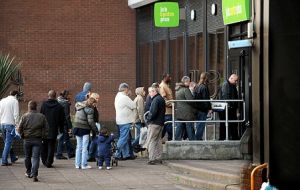MercoPress. South Atlantic News Agency
Europe’s unemployment highest in three years: 20 million jobless

Europe’s unemployment rate rose to the highest in more than three years with 20 million jobless in March and inflation held at a record low, increasing pressure on the European Central Bank to take steps to tackle the worst recession in half a century.
Unemployment rate in the Euro area jumped to 8.9%, the highest since November 2005, the European Union statistics office in Luxembourg announced Thursday. A separate report showed inflation held at 0.6% in April, the lowest since the data were first compiled in 1996.
In March an estimated 419,000 people lost their jobs across the 16 countries in the Eurozone. EU officials estimate 3.5 million jobs will be lost across the whole of the EU this year.
Unemployment across all 27 countries of the EU rose to 8.3% from 8.1% in February. The 20 million people out of work in the region is four million more than a year ago.
Spain’s unemployment rate was the highest in the region, at 17.4%. Spain, like Ireland, is seeing consumer prices decline on an annual basis, separate data today showed.
The jobless rate in Germany, Europe’s largest economy, increased for a sixth straight month.
Analysts blame a fall in the number of tourists visiting the country and a collapse in the housing market for the high rate. Unemployment is also high in the Baltic economies, which are not part of the Eurozone.
In Latvia it stands at 16.1%, 15.5% in Lithuania and 11% in Estonia. The Netherlands has the lowest rate of unemployment in Europe, at 2.8%.
Levels of unemployment are highest among people under 25 years old. Nearly one in five of are without a job across the whole of the EU.
Europe’s worst recession since World War II with rising joblessness is generating growing concerns about deflation and increasing demands for greater European Central Bank action.
The ECB, which has cut its benchmark rate by 3 percentage points since early October to a record low of 1.25% meets next on May 7. President Jean Claude Trichet has indicated the central bank will cut its benchmark rate again and promised to announce new non-standard measures to combat the crisis.
So far, the ECB has resisted following the US Federal Reserve and Bank of England, which have cut their key rates to close to zero and started pumping money into their economies by buying government and corporate debt.
The ECB has focused on trying to revive bank lending by offering financial institutions as much cash as they want against eligible collateral for up to six months. Some policy makers have suggested the ECB may soon start lending banks money for longer periods.




Top Comments
Disclaimer & comment rulesCommenting for this story is now closed.
If you have a Facebook account, become a fan and comment on our Facebook Page!